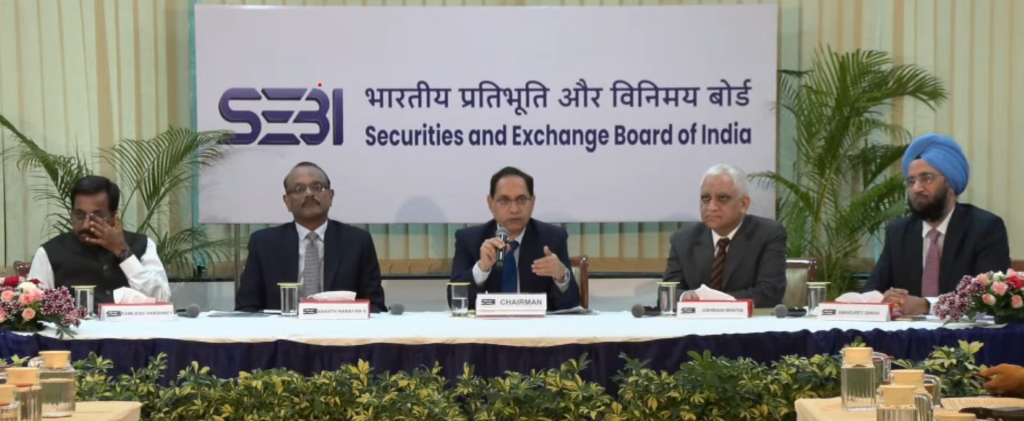The Securities and Exchange Board of India (SEBI) conducted its 209th board meeting earlier today on March 24, 2025 where few of the much anticipated regulatory changes were announced. The new norms impact Foreign Portfolio Investors (FPIs), Alternative Investment Funds (AIFs), Market Infrastructure Institutions (MIIs), investment advisors and research analysts.
It was the first board meeting headed by the new SEBI Chairperson Tuhin Kanta Pandey. Here are the key takeaways from the SEBI board meeting.
1. Disclosure threshold for FPIs doubled
SEBI had doubled the disclosure threshold for FPIs from Rs 25,000 crore to Rs 50,000 crore. This means that FPIs having equity Assets Under Management (AUM) over Rs 50,000 crore in the Indian markets must disclose details of all entities (up to the level of natural person). The circular introducing the requirement to disclose all details of entities was first released in August 2023 but the threshold for FPIs was set at Rs 25,000 crore.
SEBI says that “this specific requirement will guard against any potential circumvention of Press Note 3 stipulations by large-sized FPI with the potential to disrupt the orderly functioning of the market by their actions”.
However, the existing rule that requires the FPIs to hold more than 50% of their equity AUM in a single corporate group to make ownership disclosures has not been changed.
2- Relaxed regulations for AIFs
Category II AIFs are required to invest primarily in unlisted securities due to SEBI’s new debt listing norms. To ease the compliance, SEBI will now treat investments in listed debt securities rated ‘A’ or below as equivalent to unlisted investments, giving AIFs more options to invest while following the regulations.
3- Strengthening governance in MIIs
The appointment of Public Interest Directors (PIDs) will continue to require SEBI’s approval but the Market Infrastructure Institutions (MIIs) can now set their on cooling-off periods for directors and key executives moving to other MIIs. The appointment, reappointment or termination of key roles such as CO, CRO, CISO and CTO will require the board’s nod rather than just the NRC as was done earlier.
As per SEBI, these steps are aimed to tighten governance, prevent conflicts of interest and improve market integrity within MIIs.
4- Changes in advance fee collection rules for IAs and RAs
Earlier, the Investment Advisors (IAs) and Research Analysts (RAs) could collect advance fee for 6 months and 3 months respectively but the new rule has extended the duration to 1 year. The IAs and RAs can now charge fee up to 1 year in advance. The advance fee rules only apply to individuals and non-accredited HUF clients, not institutional investors or accredited investors.
5- Formation of a high-level committee on conflict of interest and disclosures
SEBI has also announced that it will form a “high-level committee to review regulations on conflict of interest, disclosures and governance among board members and officials”. The committee will be formed of experts from regulatory bodies, government sectors, private industries and academia and will examine and revamp the existing conflict of interest norms.
Apart from the above mentioned key changes, SEBI had decided to defer the December 18, 2024 amendment that required merchant bankers, debenture trustees and custodians to separate regulated activities into distinct legal entities. SEBI will consider alternative approaches in further meetings in the future.
Full details on the SEBI’s board meeting can be viewed in the official press release here.
The foreign portfolio investors will now have stricter disclosure norms whereas alternate investment funds will have more flexibility in debt investments. The market infrastructure institutions will face increased governance but the investment advisors and research analysts will benefit from relaxed advance fee collection rules. These new measures from SEBI are aimed to boost investor confidence, improve regulatory compliance and increase market integrity.
SEBI Chairperson Tuhin Kanta Pandey also noted that the board is continuously working to eradicate finfluencers’ malpractice. The board has taken down 70,000 unregistered finfluencers who offered investment advice without approval so far.
